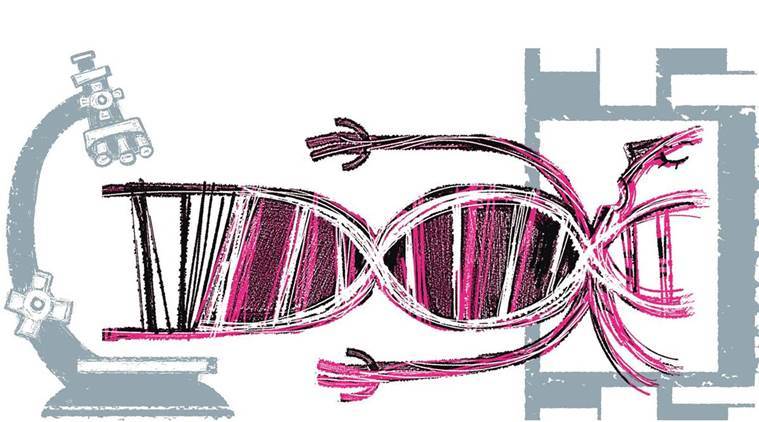 The state Criminal Investigation Department (CID), that was handed over the case after it remained unsolved for two years, is likely to seek Qureshi’s custody, sources said. (Illustration: C R Sasikumar)
The state Criminal Investigation Department (CID), that was handed over the case after it remained unsolved for two years, is likely to seek Qureshi’s custody, sources said. (Illustration: C R Sasikumar)
OVER 900 DNA tests and eight years after two girls, aged five and nine, were found raped and murdered by an unidentified accused in the Nehru Nagar area of Kurla (East), the Navi Mumbai police claimed to have solved the case. Citing a DNA match, a senior officer of the Navi Mumbai police told The Indian Express that Rehan Qureshi (34), earlier arrested by them for molesting nearly 17 girls, had allegedly also raped and killed the two Nehru Nagar-based girls. The state Criminal Investigation Department (CID), that was handed over the case after it remained unsolved for two years, is likely to seek Qureshi’s custody, sources said.
A senior IPS officer requesting anonymity said, “The blood samples had been sent to the Maharashtra Forensic Science Laboratory (FSL) to check if Qureshi’s DNA matched with that of the earlier unsolved sexual offences. The CID then specifically asked the FSL to check if his DNA matched with that of the DNA of the accused who had raped and killed the two girls. On Friday we received a letter from the FSL stating that the samples had matched.”
Sources from the FSL confirmed that they had sent a report to both the Navi Mumbai police and the state CID. They, however, refused to comment if there had been a match.
Three minor girls were raped and murdered within months of each other in 2010, in the Nehru Nagar area of Kurla. On the evening of February 9, 2010, a six-year-old girl was playing outside her house in Nehru Nagar when she went missing. Her body was found on the steps of a nearby housing society with indication of sexual abuse before murder. A month later, on March 7, 2010, a nine-year-old girl was found similarly raped and murdered. Her body was dumped on the terrace of the police quarters of Nehru Nagar police station, who were then investigating the first case.
Another nine-year-old’s body was found on the roof of a house at Vatsalatai Nagar in June 2010. The incident created panic in the entire area. Besides investigation, the police had another task – to prevent the suspected “serial killer” from committing any more crimes. The DNA tests carried out revealed that the person who committed the first two offences was the same while the one involved in the third case was someone else. The police eventually arrested Javed Shaikh, a Nehru Nagar resident, in the third case (Vatsalatai Nagar). Shaikh was convicted by the sessions court in 2015 and sentenced to life imprisonment. The first two cases had, however, remained unsolved since.
An officer said, “We had retained the DNA samples that had been extracted from the vaginal swabs of the girls who had been raped and murdered in Nehru Nagar. Earlier the local Nehru Nagar police had sent us several DNA samples of locals from the area after which we had told them that we did not have the capacity to carry out so many DNA tests. Over the years, whenever anyone involved in a major sexual offence was arrested in and around the city, his DNA would be sent to check for a match with the Nehru Nagar DNA we had preserved. We must have carried out at least 900 DNA tests over the last few years.”
An officer said apart from the Nehru Nagar case, the police have also in the process checking Qureshi’s DNA profile with that of other unsolved sexual offences like the rape and murder of three girls in south Mumbai in 2011.
Qureshi, who was out on bail since 2015, had been arrested by the Navi Mumbai police from Mira Road on September 26 for allegedly sexually assaulting at least 17 girls, aged between 12 and 15 years. Qureshi was identified when he was spotted in several CCTV camera footage around the areas where young girls had been sexually abused. In 2015, he had held the hand of a woman in Taloja and the woman reported him. He had been arrested, but managed to secure bail after which he then went off the grid. The police said that he was unmarried and resided with a physically disabled brother.